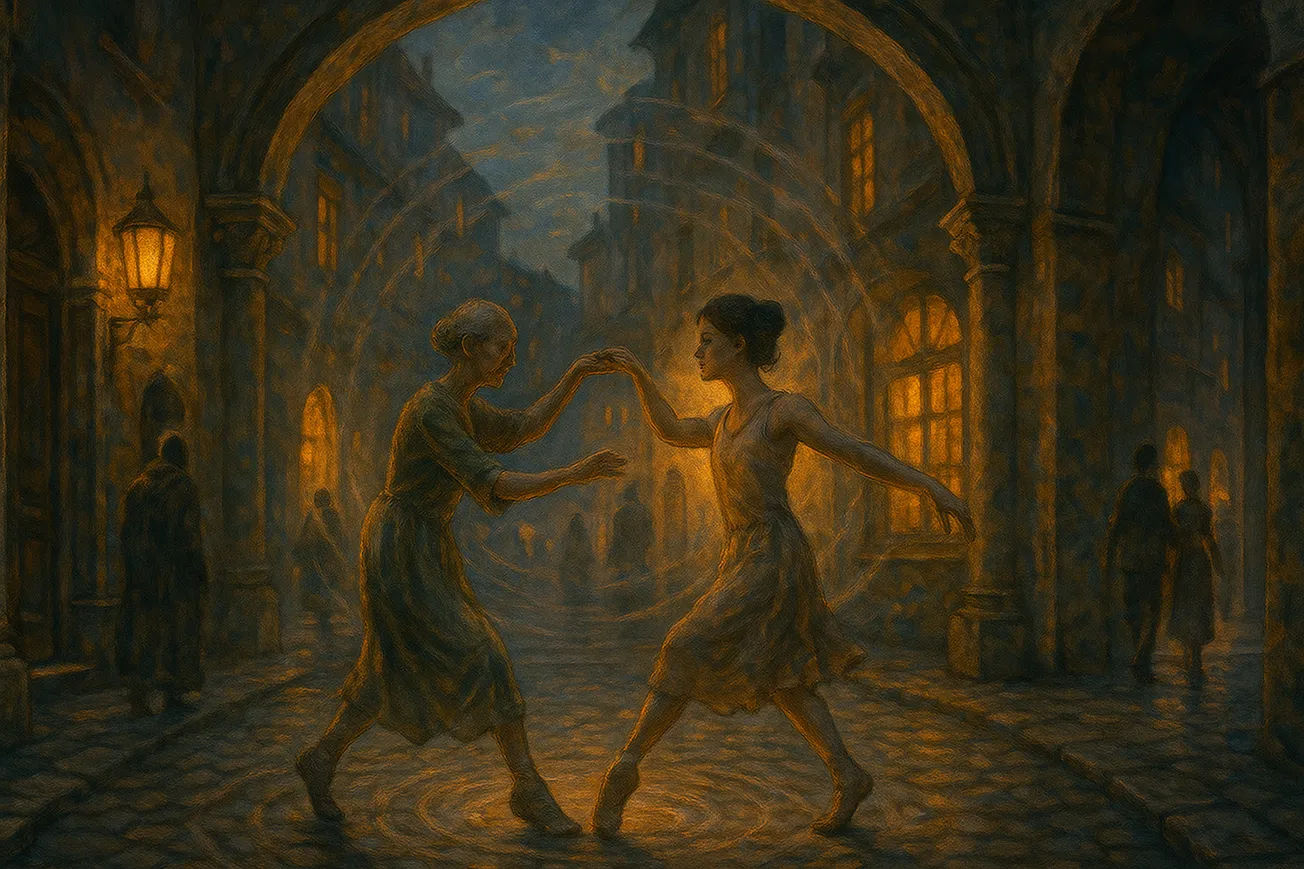🌈 The Fractal Story Engine | Body & Death | (21) BD-002-S
The old ritual was never spoken aloud. It was danced.
At dusk, the children of the seventh district would gather at the marble basin, feet wrapped in ash-thread, mouths painted with honeyed coal. They circled once for gratitude, twice for longing, and thrice for the exchange. On the final step, they would leap in place, not high, just enough for the soul to feel itself unlatched.
No one told them what it meant. That was the rule.
To speak of the switch was to lose the right.
Some said it began in the time of fractured mirrors, when the city’s memory buckled under too many truths. Others believed it came from the dream-crafters, those strange travelers who arrived barefoot and left only feathers. Whatever its origin, the ritual endured, not as novelty, but as need.
You would wake in someone else’s shape. A neighbor. A stranger. Sometimes even an enemy. You would know it immediately, as soon as you reached for your face and felt someone else's cheekbones beneath your palms.
You had one day. One full revolution.
And you could not say who you truly were.
The body became an instrument. The questions it raised were not small. Why does she stretch before standing? Why does he flinch at the scent of oranges? Why do I feel shame in a spine that is not mine?
On the morning of her fourteenth spring, Lina awoke with coarse hands and knees that bent too tightly. Her breath came short, and she tasted copper.
She did not panic.
Instead, she looked at the calluses on the fingertips. Noted the ink marks on the wrists. Walked to the glass and saw an old man’s eyes set deep in a woman’s face.
She wore it gently.
She washed. She sat at the table and did not touch the food. She listened to the birds and the hallway creaks and the brittle murmur of her borrowed joints.
At noon, she took a walk.
Children shouted from balconies. A vendor cursed his spilled tea. A wheelless cart rolled perfectly down the slope. Lina noticed that every passerby blinked twice when they looked at her.
At first she thought it might be the limp.
But then, near the library ruins, she passed a boy whose skin wore too many freckles for his age. He looked at her and paused. She nodded. He nodded back.
They said nothing.
By twilight, Lina returned to the body’s home. There was a painting half-finished by the window, with sharp lines and a single stroke of scarlet breaking through a dome of grey. She added one curved line. The hand moved confidently.
At midnight, the breath shifted.
She returned to her own body with a quiet ache in her hips and a new way of seeing light through cloth.
The next day, she passed the woman in the square. The one whose face she had worn. The woman nodded, without recognition.
But that night, Lina saw a new painting in the window. Her curved line remained, now accompanied by a field of gold and a small, hidden circle that was almost invisible.
Years passed.
The switch continued.
She became a boy in mourning. A soldier with one hand. A singer who could not bear to sing. A woman with secrets stitched into her gums. Each time, Lina entered like mist. Touched what she could. Left what she dared.
She was never recognized.
And yet, across time, small echoes began to ripple back. A letter addressed in her own childhood script, found folded beneath a vase she did not own. A pair of shoes placed on her doorstep in her exact size, though she had never measured them. A lullaby hummed by a stranger she had never met, but whose lungs she remembered borrowing.
Lina came to believe that the world was stitched not by memory or logic or will, but by this: the care you show when wearing what is not yours.
One day, long after her hair silvered and her knees remembered too many lives, Lina found herself in a body that ached with grief. The mouth could not form words. The shoulders stooped with invisible weight.
She spent the day writing letters.
Not confessions.
Just invitations.
She placed them in benches, under stones, folded into fruit stalls and library books. On each, a single phrase:
"You are being worn by someone who sees you."
When she returned to her own skin, there was a tremble in her chest and a peace in her spine.
That evening, outside her door, stood a woman with callused fingers and a curved line tattooed on her wrist. She carried a painting in one hand and a pair of ash-thread sandals in the other.
They did not speak.
They danced.
And the soul leapt, just enough to unlatch.

